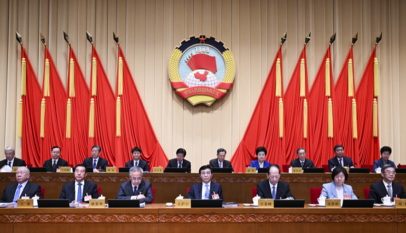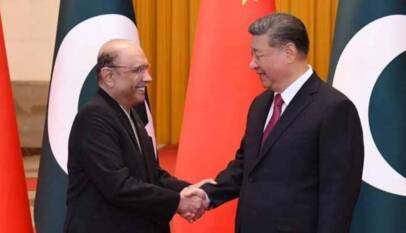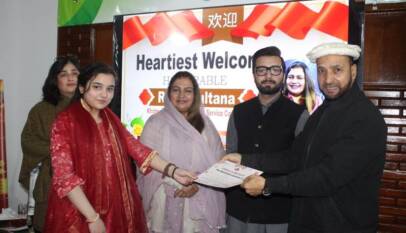International Department of Communist Party of China hails Pakistan’s all parties consensus on CPEC
The International Department of Communist Party of China (CPC), in collaboration with Pakistan-China Institute, (PCI) organized the Second Conference of the CPEC Political Parties Joint Consultation Mechanism (JCM) on the theme of ‘Working together to promote economic development and improve people’s lives through high-quality CPEC cooperation’.
During the second JCM, participated by 9 political parties representing government and opposition and officials of the business community from both sides, all parties unanimously agreed to preserve, protect and promote CPEC above party lines. Chinese Minister of the International Department of CPC Song Tao appreciated the political consensus on CPEC. President Arif Alvi, in a message to the conference, underlined Pakistan’s support to One China policy. Chinese Ambassador Yao Jing said Pak-China friendship is strengthened amid the outbreak of COVID-19.
ISLAMABAD: Leading political parties on Thursday vowed to ensure a conducive political environment and favourable public opinion for the progress and development of the China-Pakistan Economic Corridor (CPEC), besides shielding it from threats.
The political parties at the conclusion of the Second Conference of the China-Pakistan Economic Corridor (CPEC) Political Parties Joint Consultation Mechanism (JCM), through a joint statement, denounced the “slander on and disturbance in CPEC development by external forces” and pledged to “shape and safeguard the enabling political environment and favourable public opinion for CPEC development”.
The JCM was organised by the International Department of Communist Party of China (CPC) in collaboration with the Pakistan-China Institute (PCI) on the theme of ‘Working Together to Promote Economic Development and Improve People’s Lives Through High-Quality CPEC Cooperation’.
Senate Chairman Sadiq Sanjrani and Chinese Minister of the International Department of CPC Song Tao co-chaired the online session.
The virtual consultations were participated in by nine Pakistani political parties: Pakistan Tehreek-i-Insaf, Pakistan Muslim League-Nawaz, Pakistan Peoples Party, Balochistan Awami Party, National Party, Jamiat Ulema-i-Islam, Awami National Party, Jamaat-i-Islami, and Pakhtunkhwa Milli Awami Party. Senior government officials and representatives of the business community of the two countries also participated in the conference.
President Arif Alvi, in a message to the conference, reaffirmed Pakistan’s strong support to One China policy and said Islamabad opposed any foreign intervention in the internal affairs of China with regard to Hong Kong and Taiwan.
Mr Song appreciated the political consensus and noted that party-to-party cooperation bet-ween China and Pakistan was increasing as CPEC moved into a new phase.
Senator Sanjrani said that Senate would play a greater role in taking forward the consensus of political parties and delivering political support for more cooperation between the two countries under CPEC.
Chairman of the Senate Committee on Foreign Affairs Senator Mushahid Hussain Sayed, who is also the founding chairman of the Pakistan-China Institute (PCI), said: “Pakistan fully supports China in the defence of its territorial integrity and sovereignty, rejects politicising of the pandemic, appreciates China’s positive role, and rejects the notion of a new cold war. Both countries support each other’s core interests.”
He referred to the presence in China of a high-level civil-military delegation led by Foreign Minister Shah Mehmood Qureshi.
Chinese Ambassador to Pakistan Yao Jing said that the resilient nature of Pakistan-China friendship and CPEC could be gauged from the fact that it survived even the Covid-19 pandemic and became stronger.
Executive Director of PCI Mustafa Hyder Sayed called for a ‘Health Silk Road’ in the light of the Covid-19 pandemic and criticised West’s double standards on issues relating to China.
Speaking on the occasion, PPP’s Parliamentary Leader in Senate Senator Sherry Rehman said that national unity in the country was need of the hour for CPEC to thrive and prosper.
She said that all provinces must be on the same page when it came to the greater good of the country and all of them must be included by the planning ministry in their roadmap project every day.
“The CPEC goes beyond partisan politics for us, and we are all united around one fundamental truth: In a world defined by unexpected conflicts and challenges, the CPEC is the economic stabiliser that can steer Pakistan into the 21st century and become a connected highway to the future,” the PPP leader said.
Lauding President Xi Jinping’s vision, she said: “We at the PPP pay particular tribute to President Xi’s vision of the Belt and Road Initiative, under which China is stepping up to take global responsibility for global goals based on a dream of mutual growth and shared prosperity. China, under President Xi, has entered a new phase of taking up a global role. In this awakening of the dragon through a transformational vision, we appreciate that the CPEC is the poster-child of the Belt and Road Initiative, holding in its vision a potential new future for Pakistan in multiple possibilities that deepen both economic and political ties between China and Pakistan.”
“Pakistan and PPP support One China policy and the sovereignty and continual growth of China. As we see China’s investments power their way through the jugular vein of CPEC, it is a matter of both responsibility and pride that makes me say that the PPP is fully committed to realising the dream of this great platform connecting the two countries. This vision is now shared and will be carried forward by PPP under Chairman Bilawal Bhutto-Zardari’s leadership,” Ms Rehman said while highlighting PPP’s commitment towards CPEC.
“Close interactions between our two parties are a strong testimony to the dynamism of inter-party cooperation in driving CPEC forward. Over the years, the PPP government in Sindh has worked closely with Chinese officials and investors in facilitating projects, people-to-people relationships, cultural exchanges, and most importantly in ensuring the security of all those involved in CPEC projects. As part of our history of joint cooperation, PPP looks forward to continuing to work closely with local and Chinese stakeholders, including from Jiangxi province, in achieving our common goals and interests for the betterment of our people and the region.
“With employment opportunities an integral part of the CPEC dream, almost 1.1 million people can come out of the poverty trap in Pakistan. Better transport infrastructure will help Pakistan increase trade. It has been forecast that Pakistan’s trade can increase by 9.8 per cent if it implements reforms well in addition to transport infrastructure under CPEC.
“The project will create nearly 700,000 new jobs and add up to 2.5pc to Pakistan’s annual growth rate. Not to forget, the implementation of SEZs can also revolutionise the job sector and create new opportunities for entrepreneurship, which can be the key sector to accommodate the youth bulge as more than 60pc of Pakistan’s population is under the age of 30,” the PPP senator said while highlighting the benefits of CPEC for Pakistan.
Discussing changes brought about by global warming, she said: “We hope that the Chinese government can bring the clean energy initiatives they have enforced at home, to Pakistan. It is our responsibility to ensure that we are doing the best we can to protect the environment. Together, we must move towards eco-friendly, sustainable and renewable energy sources.”
China’s top political advisory body to hold annual session from March 4 to 10
ISLAMABAD, Mar 3 (APP): China’s Two Sessions, the annual gatherings of the National People…












